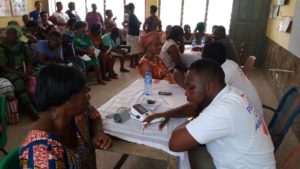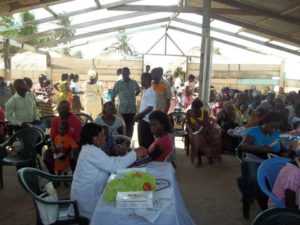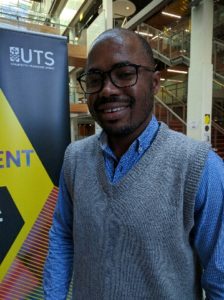‘Are you A DJ?’ – Raising Awareness Of Radiation Therapy

Imagine trying to explain how radiation therapy works to patients who believe cancer is a curse from the gods.
That was the challenge radiation therapist Andrew Donkor faced when he established a project aimed at improving knowledge of cancer and treatment in his native Ghana.
As leader of AD-Cancer Awareness, Andrew, who is currently in Sydney studying a PhD, and other health professionals would travel to remote areas of the west African nation to provide free medical screening and cancer education to the community.
Breaking down cultural barriers and a lack of knowledge about cancer and treatment proved to be a demanding task for Andrew and the group.
“In areas of Ghana, things that cannot be explained are attributed to the spiritual realm,” he said. “People thought their cancer was ‘spiritual’ – like they had been cursed by their village gods.
“It was also challenging psychologically because many of the patients came to us with advanced cancer and the only treatment was palliative care.
“There was also an assumption (among the wider population) that anyone associated with radiation therapy was going to die.
“We tried to use biological models and teach people about the different forms of cancer. It was very challenging but also fulfilling trying to help people improve their knowledge.”

Andrew and medical colleagues would work to raise awareness and knowledge of radiation therapy and cancer treatments in Ghana.
Andrew became interested in radiation therapy while studying in his native Ghana, becoming a qualified radiation therapist in 2010.
After launching the AD-Cancer Awareness project, Andrew, who was born in Obuasi in Ghana’s south, travelled to schools, church groups and other gatherings to help spread awareness of radiation therapy.
Along the way he encountered myths about radiation treatment.
“When we mentioned radiation or radiotherapy, the first thing we’d hear was, ‘Are you a DJ? Are you from a radio station’,” Andrew said. “We tried to use pictures of (treatment) machines and teach them about the different forms of cancer to help people learn more.”

Patients in Ghana had little or no knowledge about radiation therapy, while cancer treatment had stigmas that Andrew and his colleagues worked to overcome.
Andrew later completed a Masters degree in Clinical Leadership in Cancer, Palliative Care and End of Life at the University of Southampton in England before traveling back to Africa to continue other projects, including helping implement a numbering system in outpatient clinics for cancer patients.
“There were many people who didn’t want their relatives to know they had cancer or even have their name associated with cancer,” he said. “People believed if they had been diagnosed, they were cursed in some way.
“They didn’t even want their names being called out (for treatment) – it was like a stigma.
“For women with breast cancer, especially, treatment is hard because the breast is very important to African women – they felt ‘less of a woman’ if they were being treated or had surgery.
“By introducing that system, it meant patients could still retain some degree of anonymity.”

UTS student Andrew Donkor is busy with his studies and spreading the message about radiation therapy.
Andrew is now about 18 months into his PhD in Health at the University of Technology Sydney and has been investigating how to improve radiation therapy access for patients in low and middle income countries.
His research has been published in international medical journals and he is hoping to influence policy-makers by publishing more reports in this area, promoting the importance of radiation therapy as a cancer treatment.
Andrew has also been a valued part of the Targeting Cancer campaign, engaging with radiation oncologists and participating with the group’s Working Advisory Group.
“I believe radiation therapy is the new face of cancer treatment and will transform cancer care in the future,” he said. “Even just over the next couple of years, there will be a dramatic change.
“We know that radiation therapy is one of the most cost-effective treatments (for patients) – we just need to impart that knowledge.”
While he is delighted with the growing knowledge of radiation therapy in Australia, Andrew believes the journey has only just started.
“I believe much more can be done to improve knowledge and awareness of radiation therapy in Australia,” he said. “We need to do more targeting of GPs to ‘demystify’ radiation therapy.
“For example, with prostate cancer, if GPs’ knowledge is skewed to a surgery option for patients then that’s not good.
“By coming up with more innovative strategies and by campaigns like Targeting Cancer, we can do that.
“I would like radiation therapy to be an essential part of medical students’ program so they can become more aware of it and spread that knowledge.”
Are you a radiation therapist or radiation oncologist interested who would like to discover more about the Targeting Cancer campaign? Click here or email info@targetingcancer.com.au for more details.



